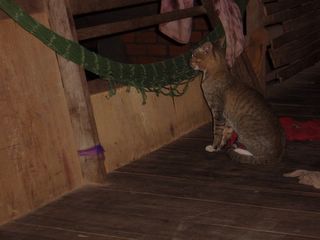In between the stories of adventures, strange meetings, angst over my work, and hope for its success, is the place I come home to at the end of the day. It’s a neighbourhood where half the residents call me “Daam” because they cannot pronounce my name. It seems so similar to the ones back home to me now that I often forget the differences until they creep up on me unexpectedly, leaving me frustrated, shocked, embarrassed, or just scratching my head in puzzlement at the strangeness of day to day life.
My house is on the second floor of a two-storey set of flats, populated by middle-class Khmer families. To my right lives Sotha, a motorbike taxi driver, with his wife, his son, and his daughter. Sotha, with nearly a hundred nouns and about twenty verbs, is by far the best English speaker in the family. We’ve been communicating by gestures, bits of English, and bits of Khmer ever since I moved in. One of my fondest memories here is of the evening when he knocked on my door unexpectedly, strolled in, nervous and bold at the same time, and began to teach me the Khmer words for my furniture, food, and household knick-knacks. His daughter, Srey, about eleven years old, was with him that night. She used to come by my door and glance inside curiously whenever I lay down at the end of the day to read a book. In the evenings we’d occasionally sit outside on the second floor porch exchanging smiles and watching the world go by beneath us.
 My House (Second Floor, Hidden by the Blinds)
My House (Second Floor, Hidden by the Blinds)When he’s not driving a motorbike, Sotha is also the neighbourhood chief, a government appointed position that seems to consist almost entirely of long hours in which he and his wife complete identification papers for a small fee. Despite the cultural differences, language barrier, and educational gap, they’ve become a little like an adopted family, always watching out for me. When a wandering cat caused a large chunk of my roof to fall in just as I was due to leave on a trip, they held onto my keys, letting the workmen in to repair it. I came home late one night to find that though the pegs were still on the line, my laundry had entirely disappeared. When I woke up the next morning, it was back again, neatly hung and eerily exactly as I had left it. I later asked Sotha, “Laundry, what happened?” “My wife,” he responded. Unable to go into any further detail thanks to the language barrier, we both shook our heads and laughed.
Compared to Srey’s quiet contemplation, Lita, the little girl living in the flat on my left is a hellraiser. Instead of gazing curiously as I used to read, she would run past the door, wearing ever-changing bits of cardboard, cloth, and miscellaneous junk, playing every Khmer child’s favourite game:
Spot the Foreigner and Shout ‘Hello! What’s Your Name?!’ as Loudly as Possible Over and Over Again. Lita liked to adapt the rules of the game though to keep it interesting. One time she sprayed me with water whenever she ran past. When her grandmother confiscated the spray bottle, she decided that he hitting me was more fun instead. The new kids who have just moved in across the street seem to lack her enthusiasm. After only one week, they’ve given up on shouting “Hello! What’s Your Name?” entirely.
Lita’s grandmother was at first a little skeptical of my presence in the building. She’s warmed up a lot though as we’ve gotten to know each other. Before she learned my name, she used to call me “Thom-Thom.” It means big guy. When I accidentally leaked water on the apartment below me, she was the one who asked me if I didn’t have a wife to keep my house clean. When she noticed my apartment was too dirty, she marched in like a soldier with a mop ready to do battle. It took all the polite effort I could muster to get her to release it and allow me to do the job myself. She came by afterwards with her daughter. They chuckled at my efforts and told me I was free to borrow their mop again anytime. Theirs was the first and only Khmer home into which I’ve been invited outside of work. She asked me in to see her newborn grandchild. Trying to be culturally sensitive, I sat with my feet pointed outwards from the group. As it turns out, this is how women sit on a floor in the home. Men sit cross-legged. Everyone had a good chuckle and I learned a valuable lesson.
Below them lives Khon, the woman from whom I buy my vegetables in the market, her husband, and their family. I discovered she was a neighbour while investigating the renovations going on in their flat. At present it resembles the after-photo from an article about an exploding gas line. The family that used to invite me to join in playing traditional New Years games when I first arrived lives two doors down from them, under Sotha’s apartment. They run a small business selling soup, sauce, toothbrushes, and other small items. They’re also some of the most hospitable and friendly people I’ve had the pleasure to meet here.
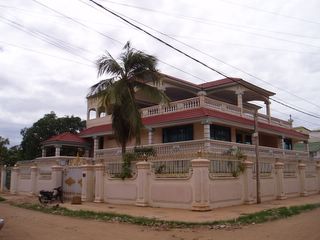 A Nearby Gated Villa
A Nearby Gated VillaAcross the street is another business, an old man who sits on a small bamboo platform, bare-chested, his waist wrapped in a plaid Khmer sarong, staring at the road from morning until evening, selling green mangoes, snacks, and small packets of shampoo. It was through this old man that I went to investigate an apartment for rent across the street from me a few weeks ago. I can still remember the look of dismay on Sotha’s face when he spotted me from his balcony inspecting the vacant apartment. It was similar to the look I received when I later told him I had begun taking meditation classes at a Wat near the Independence Monument. Exceptions to the rule in a Buddhist country, Sotha’s family and a few others in the neighbourhood are Christian. Since he doesn’t grasp what Judaism is, he still assumes I am too. Both situations involved some hurt looks and a lot of explaining, especially with the language barrier.
Near the end of the street is a middle-aged woman who sets up shop selling deep-fried rice cakes, sometimes with banana filling. We’ve gotten in the habit of smiling at each other and she always makes an added effort to sell me what she’s got, throwing in an extra cake or two for free, when we see each other at the end of the day. Beyond her is the end of the street, a wooden shack, home to a family that sells knick-knacks and rents out time on a mobile phone for a living. They use a series of massive clay pots to store their water near the back of their house. I passed by one evening only to find a middle-aged naked man. He was washing himself with water from the pots and a bucket. I looked at him casually. He looked at me casually. Given this is how people in wooden shacks tend to wash, I was unsure of how awkward his nudity should be. I smiled a bit and averted my eyes. When I turned around a few moments later, he was gone.
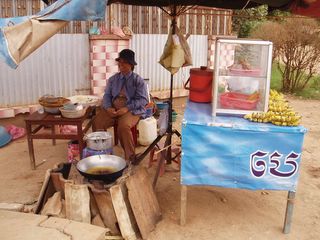 Deep Fried Rice Cake Vendor
Deep Fried Rice Cake VendorThings change a lot beyond our middle class block of flats. The gated villas of the exceedingly wealthy are within a fifty metre walk. The market is a short stroll in the opposite direction, past Sop the monkey, the neighbourhood pet. Sop spends his days leashed to an upturned metal stool, playing with children and bored moto drivers alike, begging for food, and far too often dodging abuse from young boys who have never been exposed to the concept of animal cruelty.
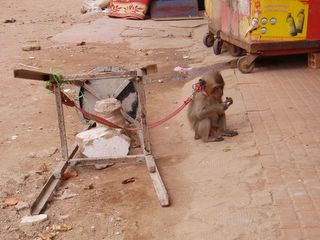 Sop the Monkey
Sop the MonkeyBeyond the market are the beginnings of countless rows of wooden one room shacks, with room enough for a bed, clothes, cooking supplies, and sometimes even a motorbike or a TV. A fire broke out over a month ago, gutting about fifty homes only a kilometer or two away. The wooden-shack ghetto is un-navigable for a foreigner. I would have had no idea if not for news articles on the subject.
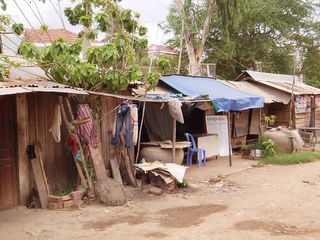 Wooden Shacks
Wooden ShacksTaking a stroll in the evening, I pass laundry services, hair stylists, and multiple NGO offices with names I sometimes recognize and sometimes don’t. I also pass children playing soccer, young adults playing badminton, and burning piles of garbage. About a month ago, I saw that a bag of garbage containing used hypodermics and assorted medical waste had exploded on the sidewalk. It’s probably better they should burn it.
With all of my focus on the problems facing Cambodia, it’s easy to lose sight of the day to day lives of the people living here. I was out for a stroll the other night, fleeing the endless shouts of “Hello!” when I realized that here was something central to my life, something neither adventurous nor development related but perhaps worth sharing all the more because of it.
